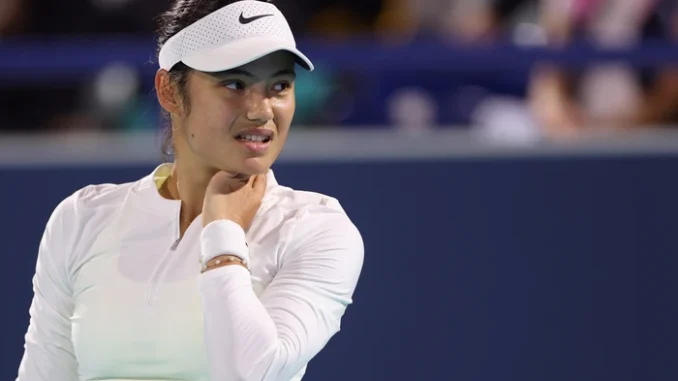
Emma Raducanu’s journey through the world of professional tennis has been a rollercoaster ride of exhilarating highs and frustrating lows. Her stunning victory at the US Open catapulted her to superstardom, but since that momentous occasion, she has struggled to consistently replicate that success. Her recent string of losses, marking her fourth consecutive defeat, has reignited discussions about the factors contributing to her fluctuating form. Amidst the analysis of her game and the speculation about her coaching changes, a new narrative has emerged, suggesting that a “revenge motivation” might be playing a role in her recent setbacks.
Raducanu’s emergence onto the scene was nothing short of meteoric. Her unexpected triumph at Flushing Meadows captured the hearts of tennis fans worldwide, and she was instantly hailed as a future star of the game. However, the whirlwind of fame and attention that followed her victory has presented its own set of challenges. She has had to navigate the pressures of heightened expectations, the demands of a grueling tour schedule, and the constant scrutiny of the media and public.
“It’s tough to keep winning matches when you’re not playing your best,” Raducanu commented after her latest defeat. This honest assessment acknowledges the difficulties she has faced in maintaining the form that propelled her to victory at the US Open. It suggests a recognition that her recent struggles are not simply a matter of bad luck or coincidence, but rather a reflection of the challenges inherent in the sport.
The narrative of “revenge motivation” suggests that opponents, perhaps stung by Raducanu’s sudden rise to prominence and her status as a Grand Slam champion, are now approaching their matches against her with added intensity and determination. They are viewing her as a prime target, eager to prove themselves against a player who has already achieved considerable success. This added pressure, it is argued, could be contributing to Raducanu’s recent struggles.
“Everyone wants to beat a Grand Slam champion,” one commentator noted, highlighting the increased motivation that opponents might feel when facing Raducanu. This sentiment underscores the competitive nature of professional tennis, where every player is striving to make their mark and establish themselves at the top of the game. For Raducanu, this means that every match is likely to be a battle, with her opponents bringing their A-game and playing with extra fire.
The idea of “revenge motivation” is not unique to tennis. In all sports, athletes who achieve significant success often find themselves facing opponents who are particularly motivated to defeat them. This is a natural consequence of competition, and it’s something that all top athletes must learn to deal with. For Raducanu, it’s a new challenge that she is still learning to navigate.
However, the “revenge motivation” narrative is not the only factor contributing to Raducanu’s recent setbacks. She has also faced challenges with consistency, adapting to different playing styles, and managing the mental and emotional pressures of professional tennis. The transition from being a relatively unknown qualifier to a Grand Slam champion has been a significant adjustment, and she is still finding her footing in this new reality.
“I’m still learning and growing as a player,” Raducanu emphasized, acknowledging the ongoing process of development that she is undergoing. This perspective is crucial, as it recognizes that her journey is still in its early stages and that there will be ups and downs along the way. The ability to learn from setbacks and continue to improve is essential for any athlete hoping to achieve long-term success.
The tennis world is watching closely to see how Raducanu responds to these recent challenges. Her talent is undeniable, and she has the potential to achieve great things in the sport. However, she will need to find a way to manage the increased pressure and expectations that come with being a Grand Slam champion. She will also need to continue to refine her game and develop the consistency and mental fortitude necessary to compete at the highest level.
The narrative of “revenge motivation” adds an interesting dimension to Raducanu’s story. It highlights the competitive landscape she now faces and the added pressure she must contend with. While this may be a contributing factor to her recent struggles, it’s important to remember that it’s just one piece of the puzzle. Raducanu’s journey is a work in progress, and her ability to adapt, learn, and grow will ultimately determine her success in the world of professional tennis. The upcoming tournaments will provide further insights into her progress and her ability to overcome the challenges she currently faces.
Leave a Reply